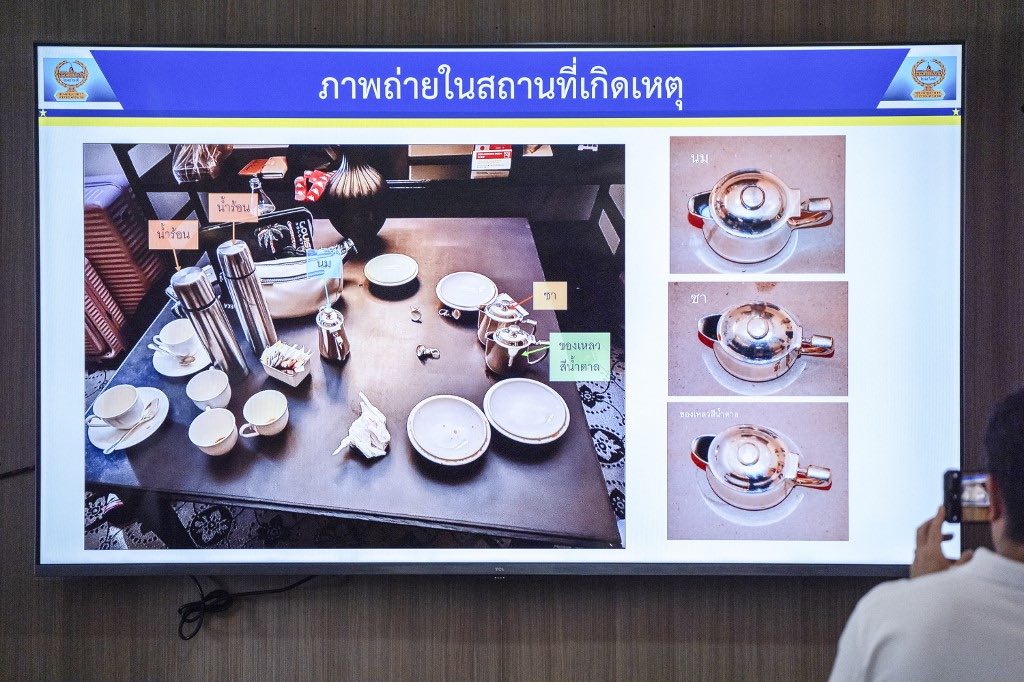Six dead in Bangkok hotel room presumed to have swallowed cyanide from teacups
All six foreign nationals found dead in a luxury Bangkok hotel are presumed to have died after ingesting cyanide from teacups, a forensic doctor who performed autopsies on the deceased said.
The bodies of six people of Vietnamese origin—two who held American citizenship—were discovered in a suite at the Grand Hyatt Erawan Hotel in the tourist center of Bangkok on Tuesday afternoon, July 16.
Photos released by police of the bloodless crime scene showed bodies scattered around the room among plates of untouched Thai food, and two thermos flasks and cups.

Initial examinations revealed the presence of cyanide in six cups, according to police.
"The mouths and nails on all the bodies turned purple, showing a lack of air could be a joint reason of the cause of the death," forensic doctor Kornkiat Vongpaisarnsin said in a press conference at the Chulalongkorn University.
"We presume they all died from cyanide which causes a lack of air in some organs," he added.
Earlier Thai police said one of the six foreigners found dead likely also carried out the poisonings, thought to be related to debts worth millions of baht.
"We are convinced that one of the six people found dead committed this crime," said Noppasil Poonsawas, a deputy commander of Bangkok police.
The Vietnamese foreign ministry said four of the dead were Vietnamese, while the other two were U.S. citizens.
The mysterious circumstances surrounding the deaths of the three men and three women, aged between 37 and 56, have fuelled wild rumors, with several local media outlets initially reporting a mass shooting incident.
Investigators also revealed that no movement had been observed around from Monday afternoon, July 15, suggesting the deaths could have occurred the day before the bodies were discovered.
Speculation a seventh person may have been part of the group was also dispelled by the police.
Tran Dinh Dung, the father of one of the victims, said his 37-year-old son was due to return to Vietnam last Sunday, July 14.
"I kept calling him but couldn't get through so I was very worried, but I didn't expect him to die in Thailand," Dung said in an interview with Vietnam's Thanh Nien newspaper.
"Phu's mother has fainted countless times, she could not bear this shock," he said.
Prime Minister Srettha Thavisin said the crime was "a private matter" unrelated to national security, and should not affect the lucrative tourist sector.
Improve image
Thai authorities are keen to improve the image of the kingdom, whose reputation as a safe tourist destination sometimes takes a hit when grisly crimes are reported.
The kingdom welcomed 28 million foreign visitors in 2023, and hopes for even more this year, to get closer to the record level of around 40 million in 2019.
The country has been the scene of several sordid and high-profile criminal cases, such as that of French serial killer Charles Sobhraj, nicknamed "The Serpent" and linked to at least two dozen murders—mostly of tourists—in the 1970s.
Fourteen victims died and one survived an alleged murder spree that spanned eight years, police said, announcing that they would file the case to the Attorney General for prosecution on Friday.
Sararat Rangsiwuthaporn is facing about 80 criminal charges, including 14 counts of premeditated murder—a record in Thai crime history, according to the police.
Last October, a 14-year-old boy opened fire at the Siam Paragon mall in the same area as Tuesday's mass poisoning, killing three people.
The shooting came just days before the anniversary of a massacre at a nursery in northern Thailand that left 36 people dead and amid government efforts to bolster tourist numbers.
Some 28 million people visited Thailand in 2023, up from 11 million the year before, but still well down from the 40 million who came in 2019, the last year before the pandemic.
Travel restrictions during the COVID-19 pandemic hammered the kingdom's vital tourism sector and arrivals have not bounced back as quickly as officials hoped.
Officials hope to hit 35 million visitors in 2024, with a target of $55 billion in revenue. (AFP)


